How Long Do Golf Cart Batteries Last? (Types, Lifespans, Factors)

Regarding golf cart batteries – it all boils down to the type and how well you look after it.
Key Takeaways:
- Lead-acid batteries are the old faithful, typically lasting 2-5 years, but they need regular TLC.
- Lithium-ion batteries are the hot rods of the battery world, lasting 10-20 years with proper care.
- I’ve seen AGM batteries fall somewhere in the middle regarding lifespan.
So, buckle up because understanding golf cart batteries is a ride through maintenance, care, and smart choices – all key to keeping your golf cart rolling smoothly on the greens.
Types of Golf Cart Batteries
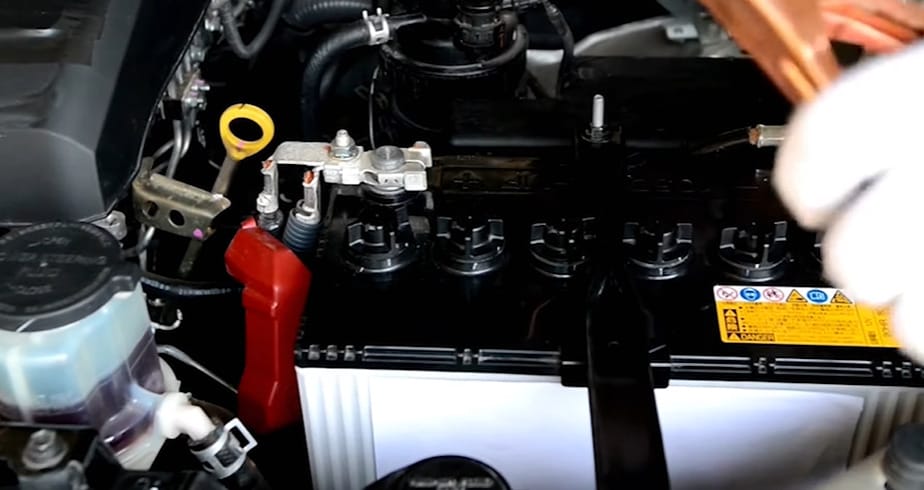
You’ve got a few choices: lead-acid, gel lead-acid, AGM, and lithium-ion.
| Battery Type | Lifespan | Technical Insights |
|---|---|---|
| Lead-Acid | 2 – 5 years | – Classic, reliable choice for golf carts. – Heavy and needs regular water top-ups. – Sensitive to deep discharges; gotta keep them charged! |
| Gel Lead-Acid | 2 – 5 years or more | – The gel inside makes them less prone to leaks. – They handle temperature swings better, which is great for those early morning rounds. |
| AGM (Absorbent Glass Mat) | 2 – 5 years or more | – Quick charging is a big plus. – The absorbent glass mat tech reduces leak risks. I’m not a fan of extreme temps, though. |
| Lithium-Ion | 10 – 20 years or more | – Lightweight champions. – Long lifespan, but your wallet will feel it. – Steady performance without needing constant maintenance. |
I’ve seen these batteries in action while fixing and fiddling with golf carts. Whether it’s the sturdy lead-acid or the fancy lithium-ion, each has its place.
Picking the right battery makes all the difference in keeping your golf cart cruising smoothly.
Factors Influencing Battery Lifespan
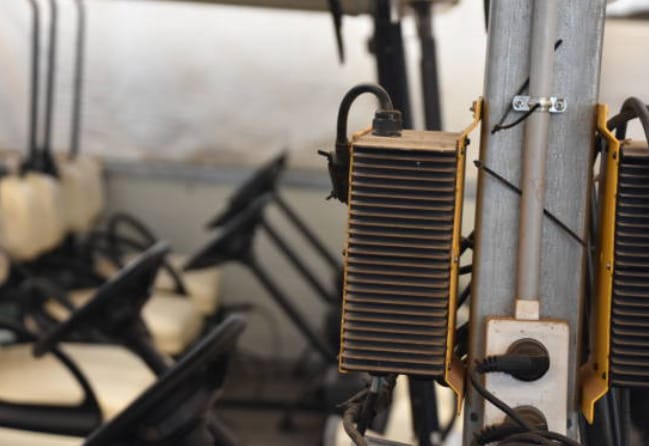
When discussing golf cart battery lifespan, it’s pivotal to consider the various factors that influence it.
- Battery Type: Lead acid, AGM, lithium-ion, each with its lifespan. But it’s not just the type; it’s about how we treat them—I learned this the hard way with my first golf cart.
- Maintenance: This is huge. Whether it’s keeping lead acid batteries topped up with water or ensuring proper charging for lithium-ion, maintenance is king.
- Usage Frequency: A tricky one. Batteries need a balance of use and rest. I learned from a neighbor’s experience that his rarely used cart battery died sooner than expected.
- Climate Impact: Living in Florida, I’ve seen how extreme heat can affect battery life, especially in lead acid and AGM types. It’s a constant battle against the elements.
In my days of zipping around the course, I’ve realized that all these factors determine how long our golf cart batteries will last.
Maintenance Practices for Longer Lifespan
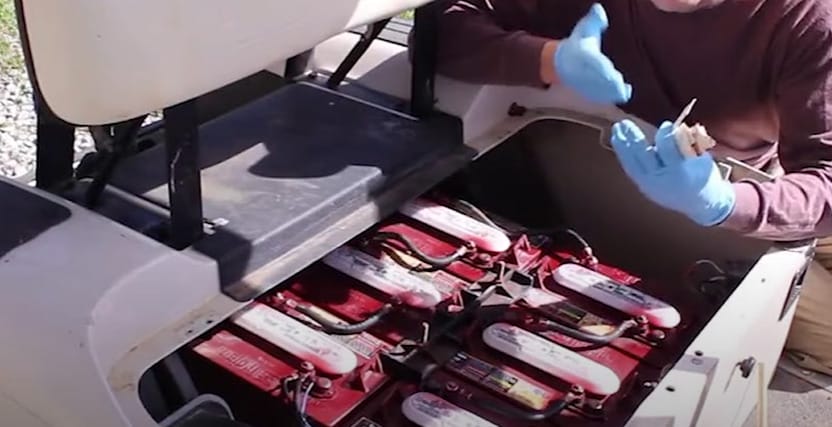
Let’s get down to business, folks! Making your golf cart batteries last longer isn’t as daunting as it seems if you’re willing to put in some consistent effort.
So brace yourself because I will share some handy tips and noteworthy practices.
- Regular Cleaning: I ensure the batteries are free from corrosive build-up, dirt, and grime. I’ve seen batteries choke up on neglect!
- Proper Charging Habits: Don’t wait till it’s dead flat. Consistent, regular charging without overdoing it is key.
- Storage Care: Keep it on a maintenance charger to avoid battery drain.
- Water Level Management: Optimize those battery water levels with distilled water. Top up post-charging.
- Gentle Driving: Treat your golf cart like a classic car, not a racecar. Avoid hard acceleration to preserve battery life. Smooth and steady wins the race.
While driving around the greens, these practices have been game-changers for battery life. It’s about regular care and sensible use.
Signs of Battery Deterioration
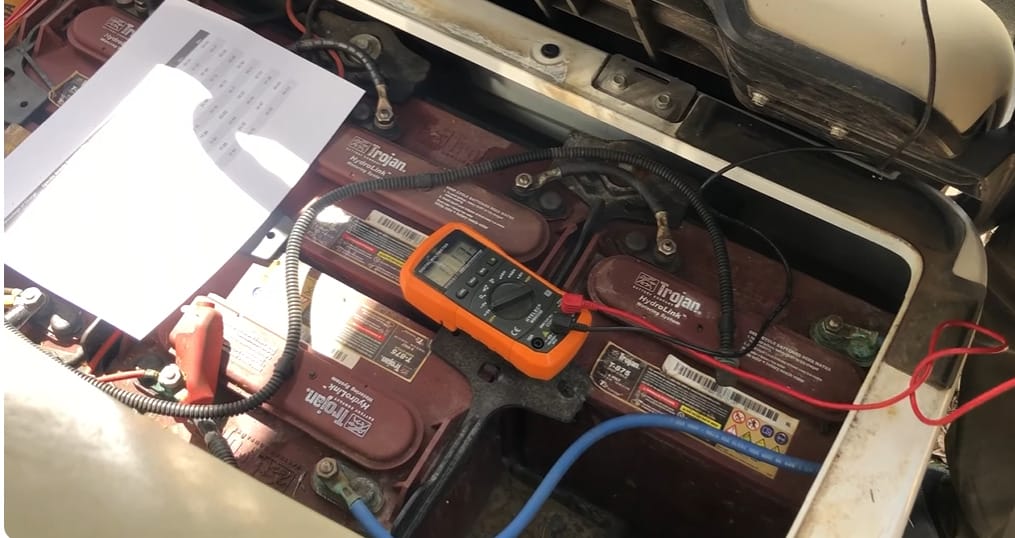
Understanding the common signs of battery deterioration can keep you a step ahead. If you’ve been maintaining those golf cart batteries, chances are high they’ll have a long life.
- Decreased Run Time: When your trusty drill starts losing steam faster than before. If that golf cart needs more frequent charging, the batteries are likely wearing down.
- Longer Charging Times: When charging takes longer, it’s often a sign your battery’s getting old.
- Physical Changes: Watch out for bloating, leaks, or corrosion on terminals – they’re like dents and scratches on your favorite tools, a sure sign of wear.
- Unusual Noises: If your batteries start sounding. Overcharging can be a stealthy battery killer.
- Performance Drops: If your golf cart’s losing its pep, especially on inclines, your batteries might be the culprit.
In my experience, keeping an eye on these signs is crucial. It’s about being proactive to ensure your golf cart keeps cruising.
Replacement and Disposal
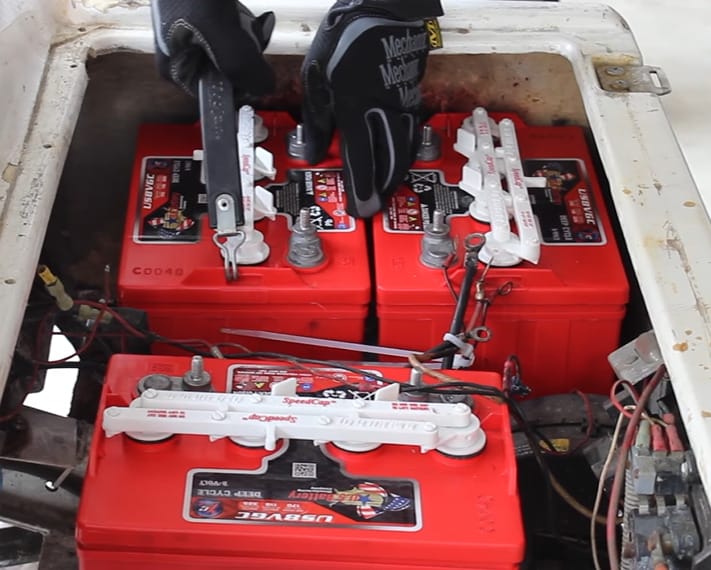
Replacing your golf cart batteries might feel like a bummer, but it’s all part of the game. Let me guide you through this, step by step.
- Match the Voltage: If your cart runs on 36 volts, stick with that. Are you changing voltages without professional advice? That’s a no-go.
- Old and New Don’t Mix: Replace the whole set to keep things running smoothly.
- Dispose Responsibly: They need to be disposed of properly. Check for local recycling programs to handle your batteries responsibly – it’s good for the environment and often required by law.
There you have it! Replacing golf cart batteries isn’t rocket science but requires some know-how.
Frequently Asked Questions
- Will My Golf Cart Battery Last Longer If I Use It Less Frequently?
- Not necessarily. Regular use and charging are important.
- Can I Replace My Golf Cart Battery Myself?
- Sure, if you’re handy. But ensure you follow safety protocols and use the correct battery type.
- Is There A Specific Type Of Water To Use For Maintenance?
- Yes, use distilled or de-ionized water for topping up batteries.
- Do All Golf Cart Batteries Require Water Top-Ups?
- No, only certain types, like lead-acid batteries, need water top-ups. Check your battery type.
- What Should I Do If My Golf Cart Battery Is Not Holding Charge?
- First, check the connections and clean any corrosion. If it still doesn’t hold charge, it might need replacement.
- Are Lithium-Ion Batteries Worth the Extra Cost for Golf Carts?
- Yes, for many users. They’re lighter, charge faster, and last longer. Think of it as investing in a high-quality tool – it costs more upfront but saves money and hassle in the long run.
References
Organizations:
- U.S. Battery Manufacturing Co. https://www.usbattery.com/
- Exide Technologies. https://www.exide.com/
Books:
- “Electric Golf Cart Repair 101 (and a half): Techniques, Tips, Tools. https://www.goodreads.com/book/show/58311728-electric-golf-cart-repair-101-and-a-half
Website Resources:
- Crown Battery – Golf Cart Battery Care: Essential Maintenance Checklist. https://www.crownbattery.com/news/easy-golf-cart-battery-care-essential-maintenance-checklist
- Continental Battery Systems – Lifespan of a Golf Cart Battery. https://www.continentalbattery.com/blog/what-is-the-lifespan-of-a-golf-cart-battery-and-5-signs-yours-needs-to-be-replaced
- Golf Cart Garage – Types of Golf Cart Batteries Explained. https://www.golfcartgarage.com/blog/types-of-golf-cart-batteries-explained/
Video References:
Golf Cart Resource
South Atlanta Golf Carts LLC
Golf Topic Reviews
